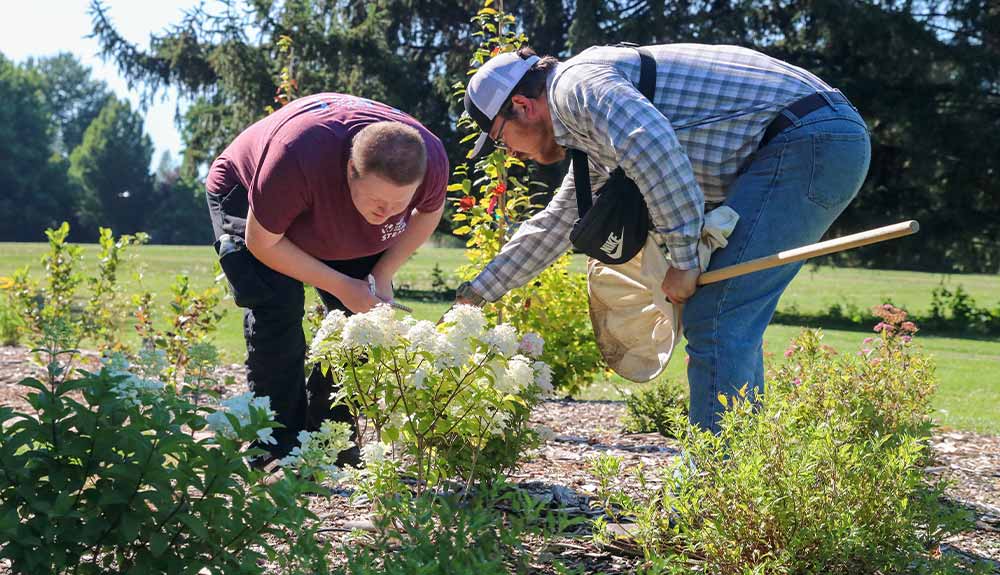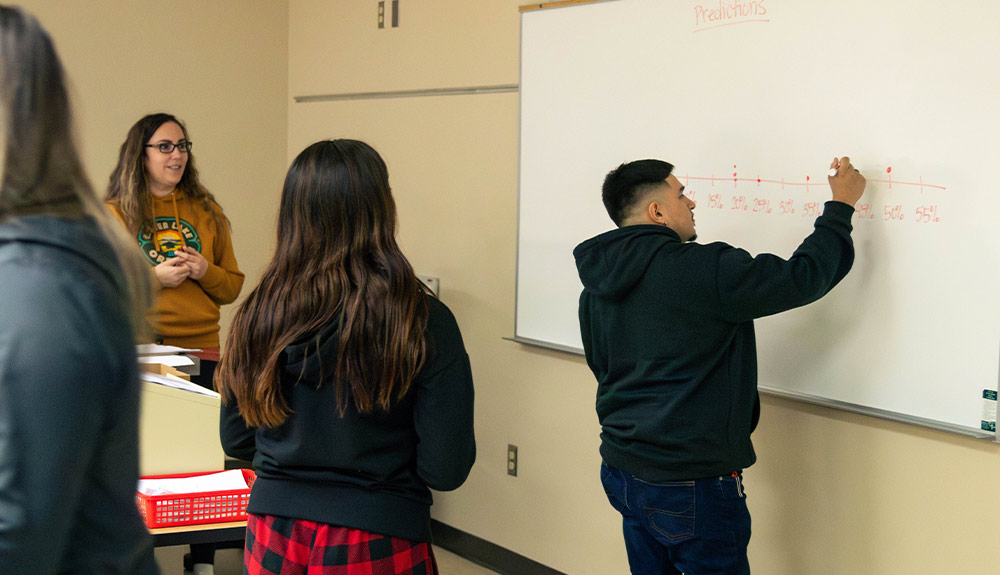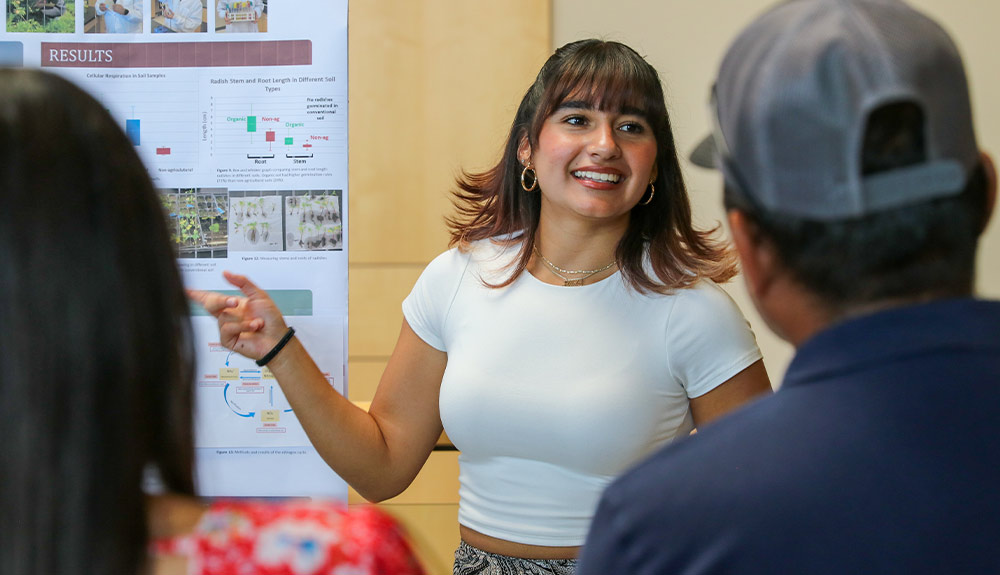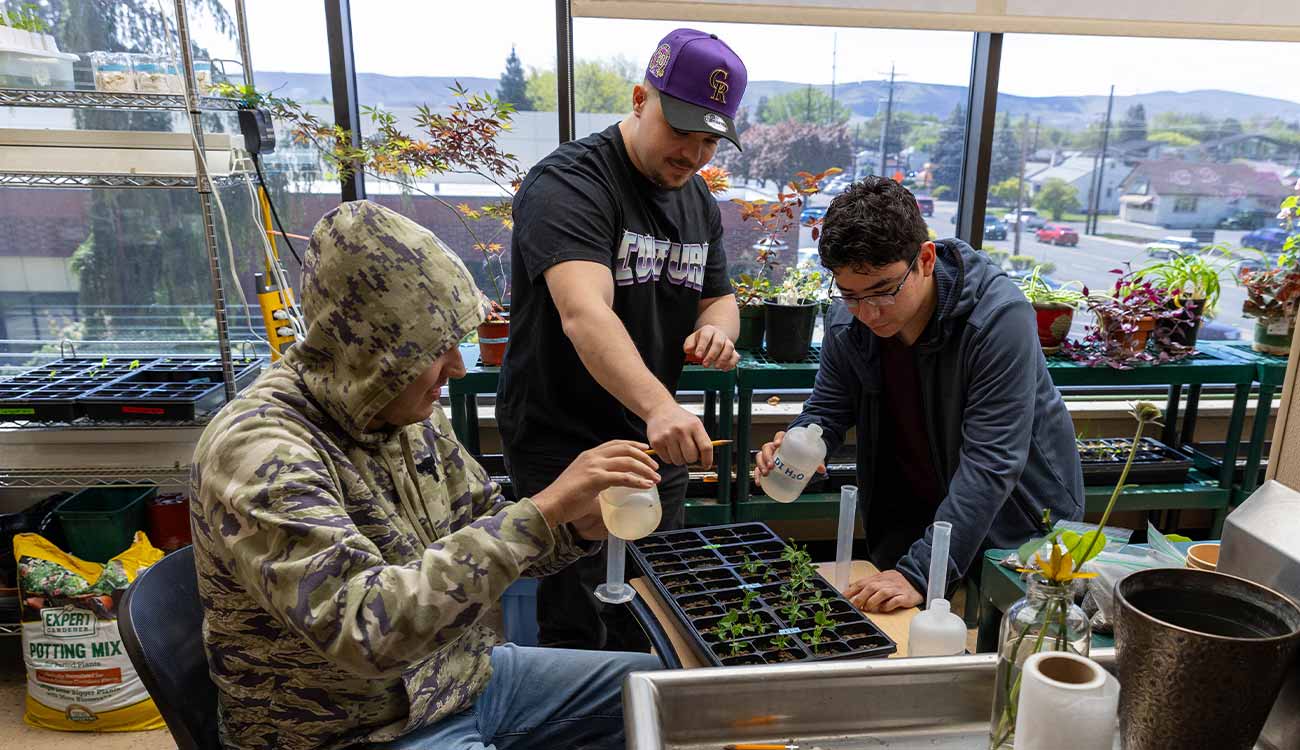Inside the Glenn Anthon Hall greenhouse, biology students Noe Rodriguez, Gio Deloza and Giancarlo Perez carefully examine trays containing seedlings of corn, radishes and peas.
It’s early May, and the three are looking for differences between two sets of plants growing in soil they recently collected from a local orchard: one growing in conventional soil and the other growing in soil from the orchard’s organic section.
So far at least, the verdict is clear.
“Organic is definitely the way to go,” Rodriguez pronounces.
While it’ll still be a few weeks before the students make a final assessment, their project is one example of how more Yakima Valley College students are getting a chance to gain hands-on experience doing research in their classes. More of the college’s faculty, particularly in STEM fields, are embedding research projects into their courses. It’s all part of an effort to boost student engagement and, ultimately, their academic and professional success.

Looking for answers
Rodriguez, Deloza and Perez were one of several teams of students in Biology Instructor Claire Carpenter’s class who were tasked with designing and carrying out their own research project during spring quarter. At the end of the quarter, each team created a research poster and presented their results to their classmates.
The trio of students previously took part in course-based research on anti-bacterial microbes in another biology course and leapt at the opportunity to choose a question they wanted to study — in this case, the effects of pesticides on soil fertility.
“I feel getting that experience of asking questions about things you encounter day-to-day, like growing plants and exploring how things like soil management impact that, it deepens our understanding of biology,” said Deloza.
Deloza has always enjoyed science and said doing hands-on research has encouraged him to ask more questions about how and why things work.
And it’s a big shift in mindset than simply being given a series of steps to follow in a lab.
“It changes the game a lot with a teacher handing you the steps to follow versus having to figure that out yourself,” said Rodriguez.
“[Research] not only fosters deeper understanding but also bridges students from diverse backgrounds to collaboratively address scientific challenges.”
— Biology Instructor Jeremy Marion
While Rodriguez’s interest in pursuing a career in astrophysics might not seem to have much in common with biology on the surface, he sees a connection.
“We’re learning about different types of life and how they occur, and so learning what affects different organisms is helpful in thinking about what life could be like on other planets,” said Rodriguez.
On an island
Mathematics Instructor Michal Ramos implemented course-based research in two of her courses for the first time this past academic year thanks to support from a State Board for Community and Technical Colleges grant dedicated to bringing undergraduate research opportunities to more students. The foundation of those research projects was a virtual world called “The Islands,” with a combined population of more than 40,000 people that can be studied to support learning about experimental design and statistical reasoning.
In her Math& 146 course, Ramos had students investigate questions such as whether eating Shiitake mushrooms affects the amount of Vitamin D in the blood or if doing a certain amount of strength training affects white blood cell count.
In Math 080 (Algebra Essentials), she designed seven projects that would enable students to build math skills in the course of carrying out their research. For example, one project tackled the concept of standard deviation by having students select some measurement that they believe varies widely among islanders (such as height), collect data, measure the standard deviation of their data and then compare their results with their classmates to see whose measurement has the most variation.
“Students who may not otherwise have an opportunity to be exposed to the research process can gain invaluable experience with these simple projects involving a virtual world of people,” Ramos said.

Ramos noted her students were able to follow instructions very smoothly, collect the necessary data and analyze it properly. And, most importantly, students were fully engaged in the research process.
“They found the virtual world of artificial intelligent people we utilized for the project very interesting and everyone was diligently working on the project for the entire class,” she noted. “Getting students’ feet wet and exposing them to the skill of research design and implementation is my goal. I’ve never tried to do research in that class before. I think that overall, it went very well.”
Ana Estrada, one of the students in Ramos’ class, enjoyed her first experience doing research and gaining a better understanding of what research involves.
“I always believed that research took more work to complete,” Estrada said. “This experience will help me in my future classes and future career as a teacher to show my students how research is done. Now, I’m curious to experiment with other kinds of research.”
Ramos plans to refine how she has students carry out research in future courses, for example, by extending the amount of time students have to carry out their project and giving students the opportunity to select their own research question.
“I would also have the students write a reflection on what they learned at the end and tell me what else they would want to know after this project, such as what other questions would they want to answer about this virtual world,” Ramos said.
“Getting that experience of asking questions about things you encounter day-to-day, like growing plants and exploring how things like soil management impact that, it deepens our understanding of biology.”
— Gio Deloza, biology student
Leading the way
Ramos was one of eight YVC faculty in psychology, agriculture, biology, chemistry and astronomy who received funding from the SBCTC grant to start integrating course-based research during the 2023-24 academic year.
Another of those faculty was Biology Instructor Jeremy Marion, who gave microbiology students a mixed bacterial culture and, over five weeks, had them employ a variety of techniques such as DNA extraction and sequencing to identify a specific strain from the mixture. Culminating the course, students collaboratively prepare a presentation detailing their findings, bacterial interactions with humans and the methodologies used.
Since incorporating research into the course, Marion says he’s observed heightened enthusiasm among students.
“My appreciation as a scientist comes from the hard work and reward intrinsic to unveiling new discoveries. Some of my most impactful undergraduate labs involved tasks that lead to more questions rather than just solving a problem,” Marion said. “My ambition is to kindle a similar curiosity in my students, especially those aspiring to healthcare roles where their primary goal will be safeguarding human health.”

While many of Marion’s students will become nurses and other healthcare professionals, prerequisite courses for students entering those fields often give little time to the research methods that established fundamental knowledge in human health. Giving students the opportunity to practice doing research, Marion said, provides an interactive, hands-on approach to their education.
“It not only fosters deeper understanding but also bridges students from diverse backgrounds to collaboratively address scientific challenges,” he said.
In the coming years, even more YVC students will gain research experience in their courses. The Washington State Board for Community and Technical Colleges received a $2 million grant in March 2024 from the National Science Foundation for a 5-year initiative to embed more research projects into class curricula. YVC is one of three colleges helping lead the state-wide effort, called the “Washington Consortium for Undergraduate Research and Equity” (WA CURE).
Biology Instructor Matthew Loeser, one of the YVC faculty members who helped develop the successful WA CURE proposal, said there are two main prongs to the effort. The first will support faculty training in offering research experiences with the goal of expanding the number of students that have an experience in their first two years of college. The second will increase student access to forums where they can present their research findings.
“Succeeding in this effort in the community college system could significantly increase the future diversity of STEM graduates,” said Loeser. “Students of the Yakima Valley will continue to see the growth in STEM opportunities at YVC and I hope this continues our momentum in building a dynamic group of STEM students, staff and faculty.”
Story by Dustin Wunderlich, director of community relations. Photos by Matthew Barton,
graphic designer/multimedia content producer; Ross Courtney; Stefanie Menard, AA-DTA
’05, communications consultant; and Dustin Wunderlich.
